Advanced Decision Making: Nursing Practice Placement Experience Report
VerifiedAdded on 2022/08/22
|8
|2215
|17
Report
AI Summary
This report provides a reflective analysis of a nursing student's experience during a placement at a neurological ward, focusing on a critical incident involving a medication error with an Alzheimer's patient. The student, responsible for patient observation, neglected to administer a prescribed medication, leading to patient agitation and the subsequent administration of a sedative without prior consultation with a doctor. The report reflects on the breach of NMBA standards, specifically the maintenance of practice capability, and highlights the importance of critical thinking, empathy, and evidence-based practice in nursing. The student acknowledges the mistake and discusses the need for improved medication management, time management, and therapeutic relationship building, referencing relevant literature to support the analysis. The report concludes with a self-assessment of the incident, emphasizing the importance of learning from mistakes, developing nursing competencies, and adhering to patient-centered care principles to ensure safe and effective patient outcomes. The appendix outlines the placement experience in detail.
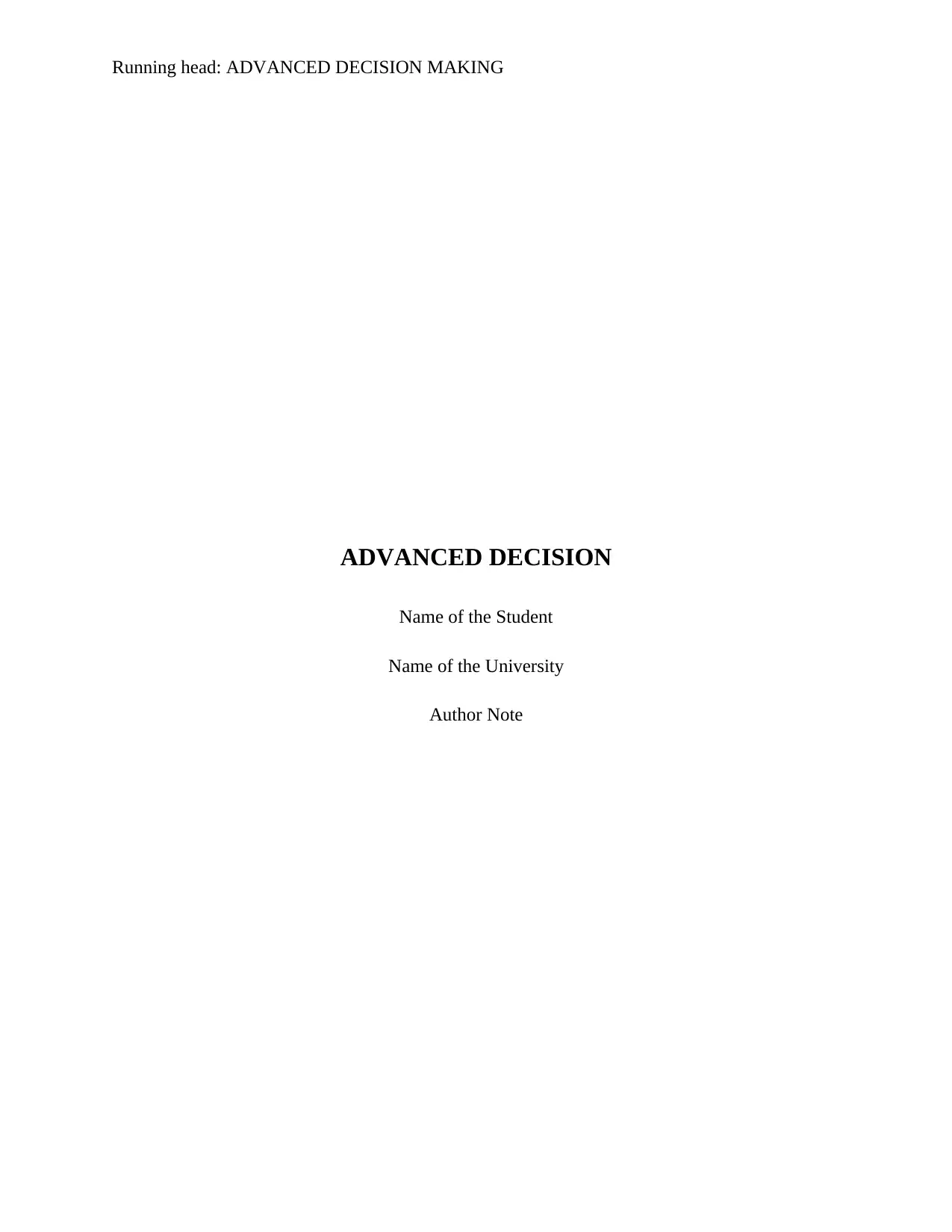
Running head: ADVANCED DECISION MAKING
ADVANCED DECISION
Name of the Student
Name of the University
Author Note
ADVANCED DECISION
Name of the Student
Name of the University
Author Note
Paraphrase This Document
Need a fresh take? Get an instant paraphrase of this document with our AI Paraphraser
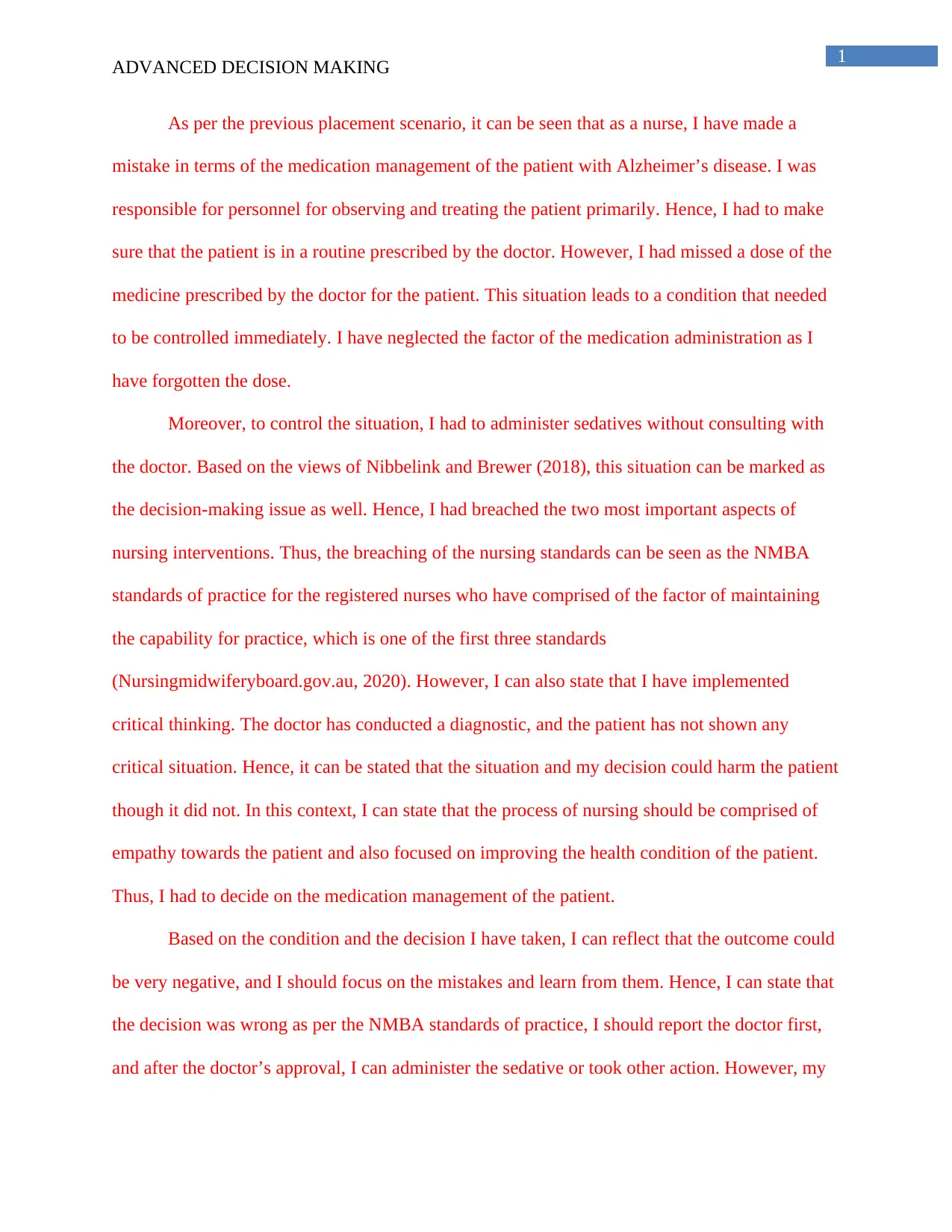
1
ADVANCED DECISION MAKING
As per the previous placement scenario, it can be seen that as a nurse, I have made a
mistake in terms of the medication management of the patient with Alzheimer’s disease. I was
responsible for personnel for observing and treating the patient primarily. Hence, I had to make
sure that the patient is in a routine prescribed by the doctor. However, I had missed a dose of the
medicine prescribed by the doctor for the patient. This situation leads to a condition that needed
to be controlled immediately. I have neglected the factor of the medication administration as I
have forgotten the dose.
Moreover, to control the situation, I had to administer sedatives without consulting with
the doctor. Based on the views of Nibbelink and Brewer (2018), this situation can be marked as
the decision-making issue as well. Hence, I had breached the two most important aspects of
nursing interventions. Thus, the breaching of the nursing standards can be seen as the NMBA
standards of practice for the registered nurses who have comprised of the factor of maintaining
the capability for practice, which is one of the first three standards
(Nursingmidwiferyboard.gov.au, 2020). However, I can also state that I have implemented
critical thinking. The doctor has conducted a diagnostic, and the patient has not shown any
critical situation. Hence, it can be stated that the situation and my decision could harm the patient
though it did not. In this context, I can state that the process of nursing should be comprised of
empathy towards the patient and also focused on improving the health condition of the patient.
Thus, I had to decide on the medication management of the patient.
Based on the condition and the decision I have taken, I can reflect that the outcome could
be very negative, and I should focus on the mistakes and learn from them. Hence, I can state that
the decision was wrong as per the NMBA standards of practice, I should report the doctor first,
and after the doctor’s approval, I can administer the sedative or took other action. However, my
ADVANCED DECISION MAKING
As per the previous placement scenario, it can be seen that as a nurse, I have made a
mistake in terms of the medication management of the patient with Alzheimer’s disease. I was
responsible for personnel for observing and treating the patient primarily. Hence, I had to make
sure that the patient is in a routine prescribed by the doctor. However, I had missed a dose of the
medicine prescribed by the doctor for the patient. This situation leads to a condition that needed
to be controlled immediately. I have neglected the factor of the medication administration as I
have forgotten the dose.
Moreover, to control the situation, I had to administer sedatives without consulting with
the doctor. Based on the views of Nibbelink and Brewer (2018), this situation can be marked as
the decision-making issue as well. Hence, I had breached the two most important aspects of
nursing interventions. Thus, the breaching of the nursing standards can be seen as the NMBA
standards of practice for the registered nurses who have comprised of the factor of maintaining
the capability for practice, which is one of the first three standards
(Nursingmidwiferyboard.gov.au, 2020). However, I can also state that I have implemented
critical thinking. The doctor has conducted a diagnostic, and the patient has not shown any
critical situation. Hence, it can be stated that the situation and my decision could harm the patient
though it did not. In this context, I can state that the process of nursing should be comprised of
empathy towards the patient and also focused on improving the health condition of the patient.
Thus, I had to decide on the medication management of the patient.
Based on the condition and the decision I have taken, I can reflect that the outcome could
be very negative, and I should focus on the mistakes and learn from them. Hence, I can state that
the decision was wrong as per the NMBA standards of practice, I should report the doctor first,
and after the doctor’s approval, I can administer the sedative or took other action. However, my
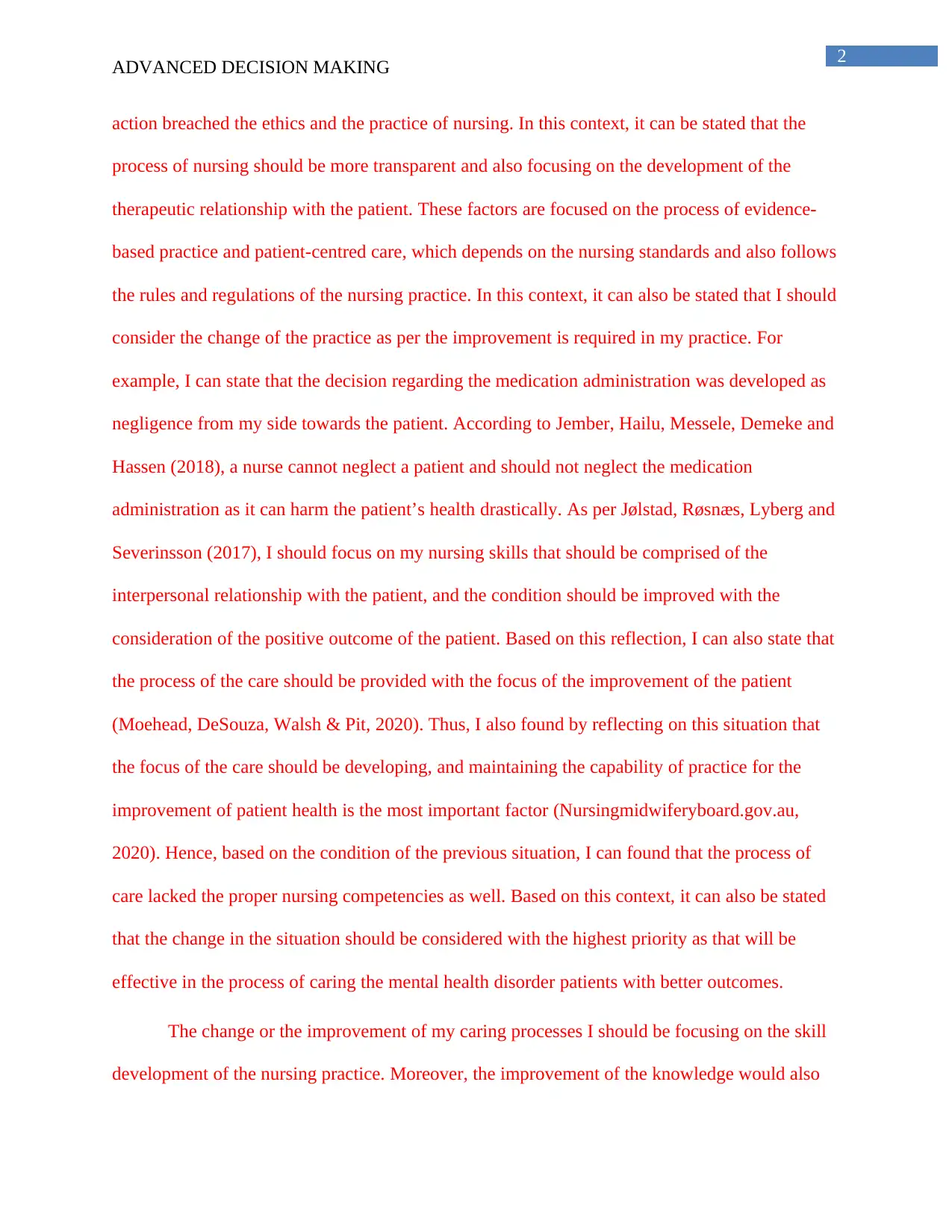
2
ADVANCED DECISION MAKING
action breached the ethics and the practice of nursing. In this context, it can be stated that the
process of nursing should be more transparent and also focusing on the development of the
therapeutic relationship with the patient. These factors are focused on the process of evidence-
based practice and patient-centred care, which depends on the nursing standards and also follows
the rules and regulations of the nursing practice. In this context, it can also be stated that I should
consider the change of the practice as per the improvement is required in my practice. For
example, I can state that the decision regarding the medication administration was developed as
negligence from my side towards the patient. According to Jember, Hailu, Messele, Demeke and
Hassen (2018), a nurse cannot neglect a patient and should not neglect the medication
administration as it can harm the patient’s health drastically. As per Jølstad, Røsnæs, Lyberg and
Severinsson (2017), I should focus on my nursing skills that should be comprised of the
interpersonal relationship with the patient, and the condition should be improved with the
consideration of the positive outcome of the patient. Based on this reflection, I can also state that
the process of the care should be provided with the focus of the improvement of the patient
(Moehead, DeSouza, Walsh & Pit, 2020). Thus, I also found by reflecting on this situation that
the focus of the care should be developing, and maintaining the capability of practice for the
improvement of patient health is the most important factor (Nursingmidwiferyboard.gov.au,
2020). Hence, based on the condition of the previous situation, I can found that the process of
care lacked the proper nursing competencies as well. Based on this context, it can also be stated
that the change in the situation should be considered with the highest priority as that will be
effective in the process of caring the mental health disorder patients with better outcomes.
The change or the improvement of my caring processes I should be focusing on the skill
development of the nursing practice. Moreover, the improvement of the knowledge would also
ADVANCED DECISION MAKING
action breached the ethics and the practice of nursing. In this context, it can be stated that the
process of nursing should be more transparent and also focusing on the development of the
therapeutic relationship with the patient. These factors are focused on the process of evidence-
based practice and patient-centred care, which depends on the nursing standards and also follows
the rules and regulations of the nursing practice. In this context, it can also be stated that I should
consider the change of the practice as per the improvement is required in my practice. For
example, I can state that the decision regarding the medication administration was developed as
negligence from my side towards the patient. According to Jember, Hailu, Messele, Demeke and
Hassen (2018), a nurse cannot neglect a patient and should not neglect the medication
administration as it can harm the patient’s health drastically. As per Jølstad, Røsnæs, Lyberg and
Severinsson (2017), I should focus on my nursing skills that should be comprised of the
interpersonal relationship with the patient, and the condition should be improved with the
consideration of the positive outcome of the patient. Based on this reflection, I can also state that
the process of the care should be provided with the focus of the improvement of the patient
(Moehead, DeSouza, Walsh & Pit, 2020). Thus, I also found by reflecting on this situation that
the focus of the care should be developing, and maintaining the capability of practice for the
improvement of patient health is the most important factor (Nursingmidwiferyboard.gov.au,
2020). Hence, based on the condition of the previous situation, I can found that the process of
care lacked the proper nursing competencies as well. Based on this context, it can also be stated
that the change in the situation should be considered with the highest priority as that will be
effective in the process of caring the mental health disorder patients with better outcomes.
The change or the improvement of my caring processes I should be focusing on the skill
development of the nursing practice. Moreover, the improvement of the knowledge would also
⊘ This is a preview!⊘
Do you want full access?
Subscribe today to unlock all pages.

Trusted by 1+ million students worldwide
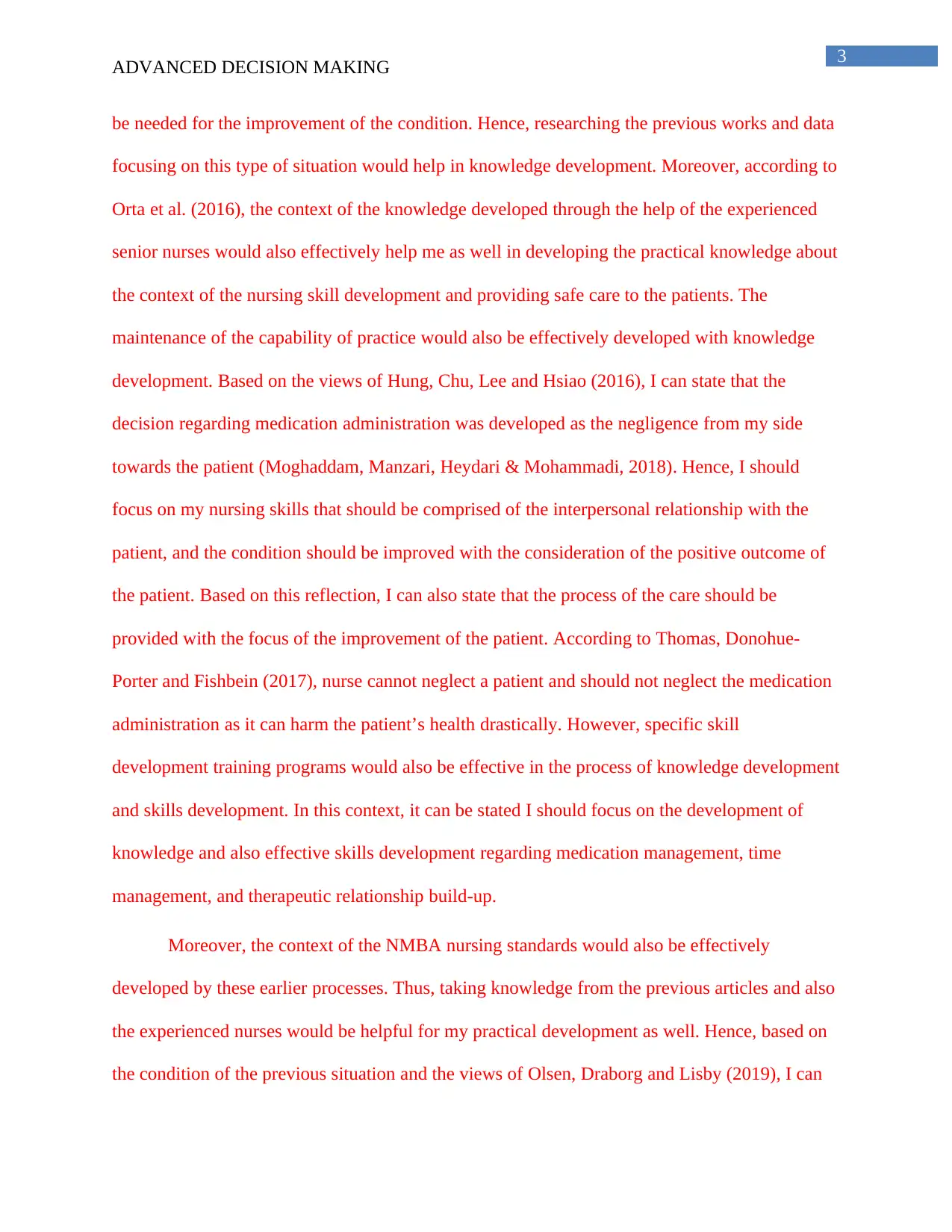
3
ADVANCED DECISION MAKING
be needed for the improvement of the condition. Hence, researching the previous works and data
focusing on this type of situation would help in knowledge development. Moreover, according to
Orta et al. (2016), the context of the knowledge developed through the help of the experienced
senior nurses would also effectively help me as well in developing the practical knowledge about
the context of the nursing skill development and providing safe care to the patients. The
maintenance of the capability of practice would also be effectively developed with knowledge
development. Based on the views of Hung, Chu, Lee and Hsiao (2016), I can state that the
decision regarding medication administration was developed as the negligence from my side
towards the patient (Moghaddam, Manzari, Heydari & Mohammadi, 2018). Hence, I should
focus on my nursing skills that should be comprised of the interpersonal relationship with the
patient, and the condition should be improved with the consideration of the positive outcome of
the patient. Based on this reflection, I can also state that the process of the care should be
provided with the focus of the improvement of the patient. According to Thomas, Donohue-
Porter and Fishbein (2017), nurse cannot neglect a patient and should not neglect the medication
administration as it can harm the patient’s health drastically. However, specific skill
development training programs would also be effective in the process of knowledge development
and skills development. In this context, it can be stated I should focus on the development of
knowledge and also effective skills development regarding medication management, time
management, and therapeutic relationship build-up.
Moreover, the context of the NMBA nursing standards would also be effectively
developed by these earlier processes. Thus, taking knowledge from the previous articles and also
the experienced nurses would be helpful for my practical development as well. Hence, based on
the condition of the previous situation and the views of Olsen, Draborg and Lisby (2019), I can
ADVANCED DECISION MAKING
be needed for the improvement of the condition. Hence, researching the previous works and data
focusing on this type of situation would help in knowledge development. Moreover, according to
Orta et al. (2016), the context of the knowledge developed through the help of the experienced
senior nurses would also effectively help me as well in developing the practical knowledge about
the context of the nursing skill development and providing safe care to the patients. The
maintenance of the capability of practice would also be effectively developed with knowledge
development. Based on the views of Hung, Chu, Lee and Hsiao (2016), I can state that the
decision regarding medication administration was developed as the negligence from my side
towards the patient (Moghaddam, Manzari, Heydari & Mohammadi, 2018). Hence, I should
focus on my nursing skills that should be comprised of the interpersonal relationship with the
patient, and the condition should be improved with the consideration of the positive outcome of
the patient. Based on this reflection, I can also state that the process of the care should be
provided with the focus of the improvement of the patient. According to Thomas, Donohue-
Porter and Fishbein (2017), nurse cannot neglect a patient and should not neglect the medication
administration as it can harm the patient’s health drastically. However, specific skill
development training programs would also be effective in the process of knowledge development
and skills development. In this context, it can be stated I should focus on the development of
knowledge and also effective skills development regarding medication management, time
management, and therapeutic relationship build-up.
Moreover, the context of the NMBA nursing standards would also be effectively
developed by these earlier processes. Thus, taking knowledge from the previous articles and also
the experienced nurses would be helpful for my practical development as well. Hence, based on
the condition of the previous situation and the views of Olsen, Draborg and Lisby (2019), I can
Paraphrase This Document
Need a fresh take? Get an instant paraphrase of this document with our AI Paraphraser
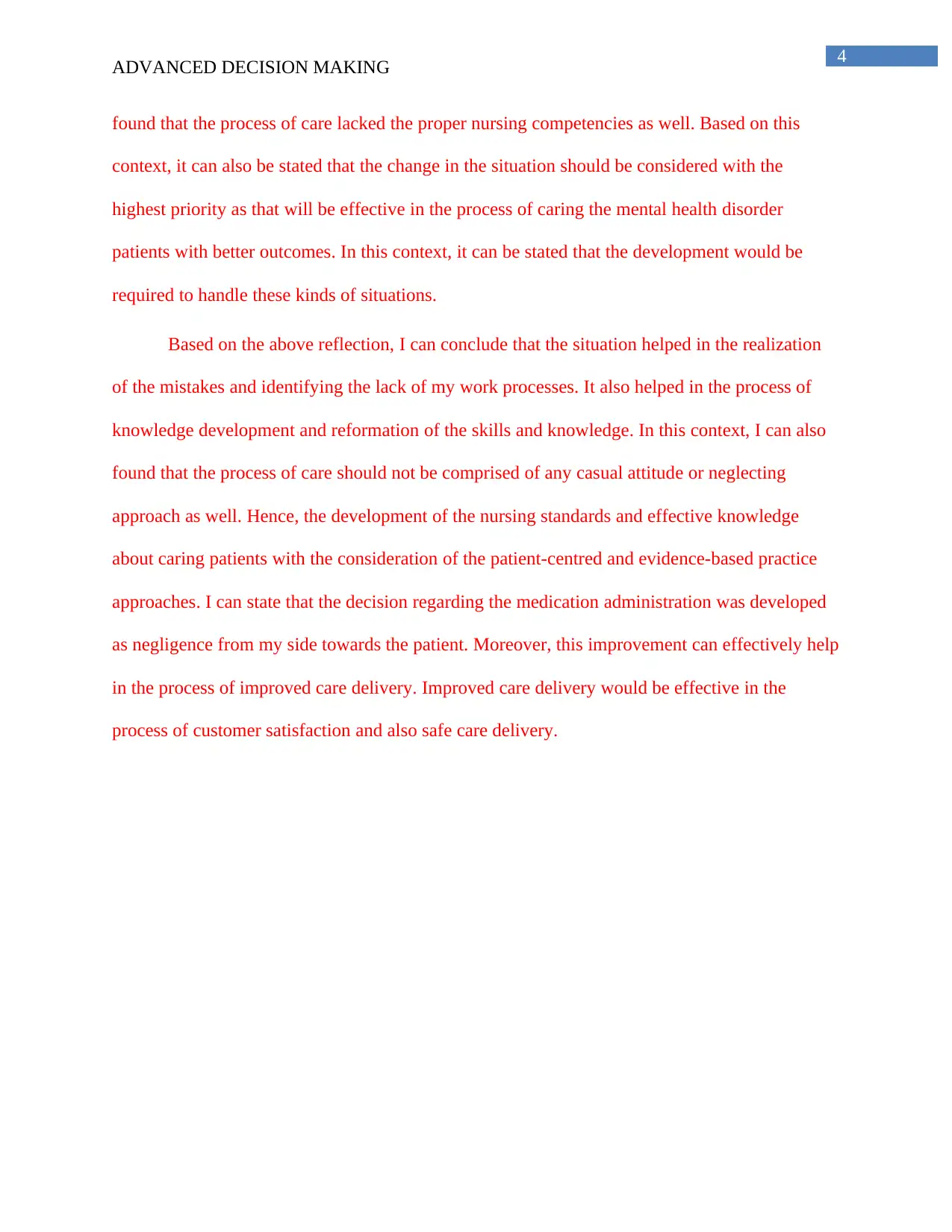
4
ADVANCED DECISION MAKING
found that the process of care lacked the proper nursing competencies as well. Based on this
context, it can also be stated that the change in the situation should be considered with the
highest priority as that will be effective in the process of caring the mental health disorder
patients with better outcomes. In this context, it can be stated that the development would be
required to handle these kinds of situations.
Based on the above reflection, I can conclude that the situation helped in the realization
of the mistakes and identifying the lack of my work processes. It also helped in the process of
knowledge development and reformation of the skills and knowledge. In this context, I can also
found that the process of care should not be comprised of any casual attitude or neglecting
approach as well. Hence, the development of the nursing standards and effective knowledge
about caring patients with the consideration of the patient-centred and evidence-based practice
approaches. I can state that the decision regarding the medication administration was developed
as negligence from my side towards the patient. Moreover, this improvement can effectively help
in the process of improved care delivery. Improved care delivery would be effective in the
process of customer satisfaction and also safe care delivery.
ADVANCED DECISION MAKING
found that the process of care lacked the proper nursing competencies as well. Based on this
context, it can also be stated that the change in the situation should be considered with the
highest priority as that will be effective in the process of caring the mental health disorder
patients with better outcomes. In this context, it can be stated that the development would be
required to handle these kinds of situations.
Based on the above reflection, I can conclude that the situation helped in the realization
of the mistakes and identifying the lack of my work processes. It also helped in the process of
knowledge development and reformation of the skills and knowledge. In this context, I can also
found that the process of care should not be comprised of any casual attitude or neglecting
approach as well. Hence, the development of the nursing standards and effective knowledge
about caring patients with the consideration of the patient-centred and evidence-based practice
approaches. I can state that the decision regarding the medication administration was developed
as negligence from my side towards the patient. Moreover, this improvement can effectively help
in the process of improved care delivery. Improved care delivery would be effective in the
process of customer satisfaction and also safe care delivery.
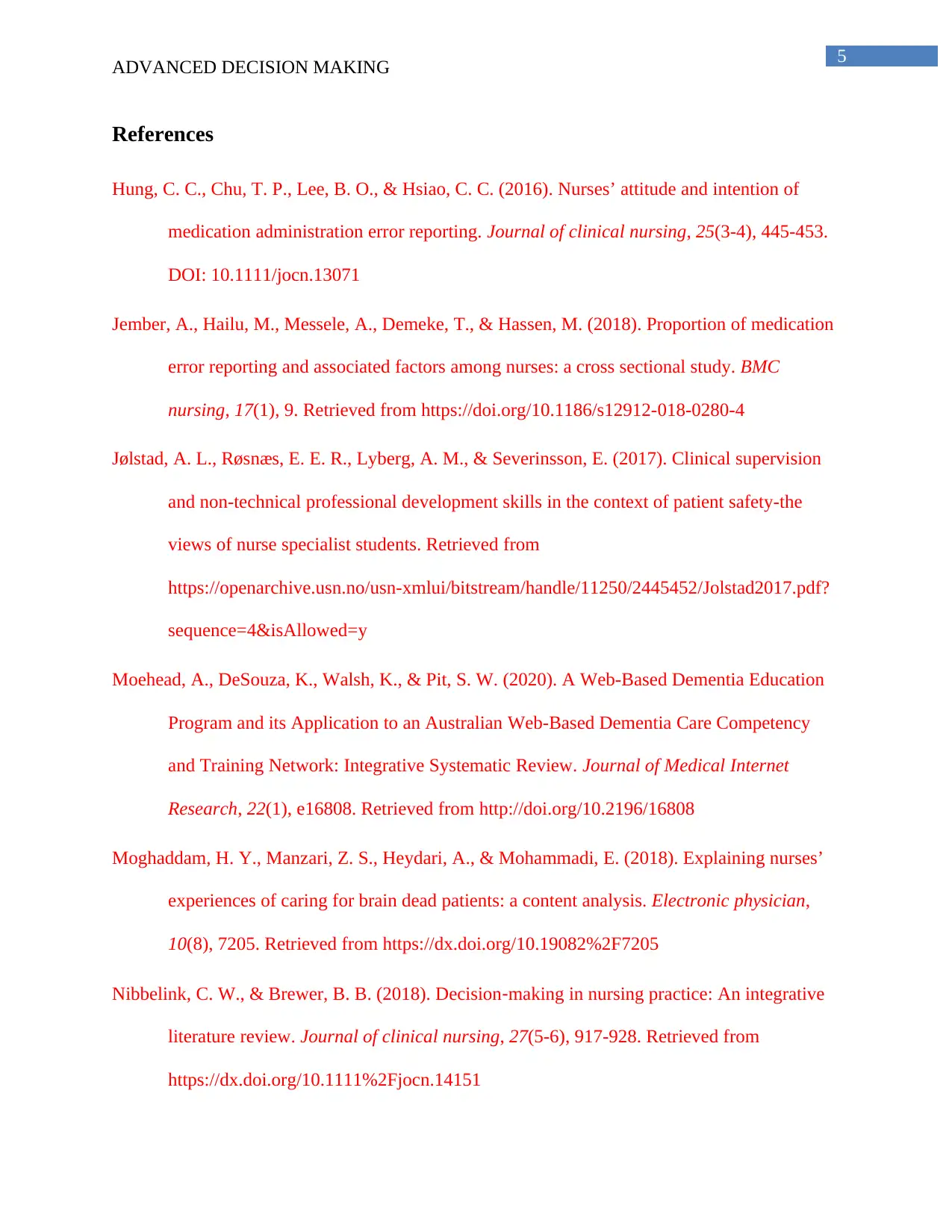
5
ADVANCED DECISION MAKING
References
Hung, C. C., Chu, T. P., Lee, B. O., & Hsiao, C. C. (2016). Nurses’ attitude and intention of
medication administration error reporting. Journal of clinical nursing, 25(3-4), 445-453.
DOI: 10.1111/jocn.13071
Jember, A., Hailu, M., Messele, A., Demeke, T., & Hassen, M. (2018). Proportion of medication
error reporting and associated factors among nurses: a cross sectional study. BMC
nursing, 17(1), 9. Retrieved from https://doi.org/10.1186/s12912-018-0280-4
Jølstad, A. L., Røsnæs, E. E. R., Lyberg, A. M., & Severinsson, E. (2017). Clinical supervision
and non-technical professional development skills in the context of patient safety-the
views of nurse specialist students. Retrieved from
https://openarchive.usn.no/usn-xmlui/bitstream/handle/11250/2445452/Jolstad2017.pdf?
sequence=4&isAllowed=y
Moehead, A., DeSouza, K., Walsh, K., & Pit, S. W. (2020). A Web-Based Dementia Education
Program and its Application to an Australian Web-Based Dementia Care Competency
and Training Network: Integrative Systematic Review. Journal of Medical Internet
Research, 22(1), e16808. Retrieved from http://doi.org/10.2196/16808
Moghaddam, H. Y., Manzari, Z. S., Heydari, A., & Mohammadi, E. (2018). Explaining nurses’
experiences of caring for brain dead patients: a content analysis. Electronic physician,
10(8), 7205. Retrieved from https://dx.doi.org/10.19082%2F7205
Nibbelink, C. W., & Brewer, B. B. (2018). Decision‐making in nursing practice: An integrative
literature review. Journal of clinical nursing, 27(5-6), 917-928. Retrieved from
https://dx.doi.org/10.1111%2Fjocn.14151
ADVANCED DECISION MAKING
References
Hung, C. C., Chu, T. P., Lee, B. O., & Hsiao, C. C. (2016). Nurses’ attitude and intention of
medication administration error reporting. Journal of clinical nursing, 25(3-4), 445-453.
DOI: 10.1111/jocn.13071
Jember, A., Hailu, M., Messele, A., Demeke, T., & Hassen, M. (2018). Proportion of medication
error reporting and associated factors among nurses: a cross sectional study. BMC
nursing, 17(1), 9. Retrieved from https://doi.org/10.1186/s12912-018-0280-4
Jølstad, A. L., Røsnæs, E. E. R., Lyberg, A. M., & Severinsson, E. (2017). Clinical supervision
and non-technical professional development skills in the context of patient safety-the
views of nurse specialist students. Retrieved from
https://openarchive.usn.no/usn-xmlui/bitstream/handle/11250/2445452/Jolstad2017.pdf?
sequence=4&isAllowed=y
Moehead, A., DeSouza, K., Walsh, K., & Pit, S. W. (2020). A Web-Based Dementia Education
Program and its Application to an Australian Web-Based Dementia Care Competency
and Training Network: Integrative Systematic Review. Journal of Medical Internet
Research, 22(1), e16808. Retrieved from http://doi.org/10.2196/16808
Moghaddam, H. Y., Manzari, Z. S., Heydari, A., & Mohammadi, E. (2018). Explaining nurses’
experiences of caring for brain dead patients: a content analysis. Electronic physician,
10(8), 7205. Retrieved from https://dx.doi.org/10.19082%2F7205
Nibbelink, C. W., & Brewer, B. B. (2018). Decision‐making in nursing practice: An integrative
literature review. Journal of clinical nursing, 27(5-6), 917-928. Retrieved from
https://dx.doi.org/10.1111%2Fjocn.14151
⊘ This is a preview!⊘
Do you want full access?
Subscribe today to unlock all pages.

Trusted by 1+ million students worldwide
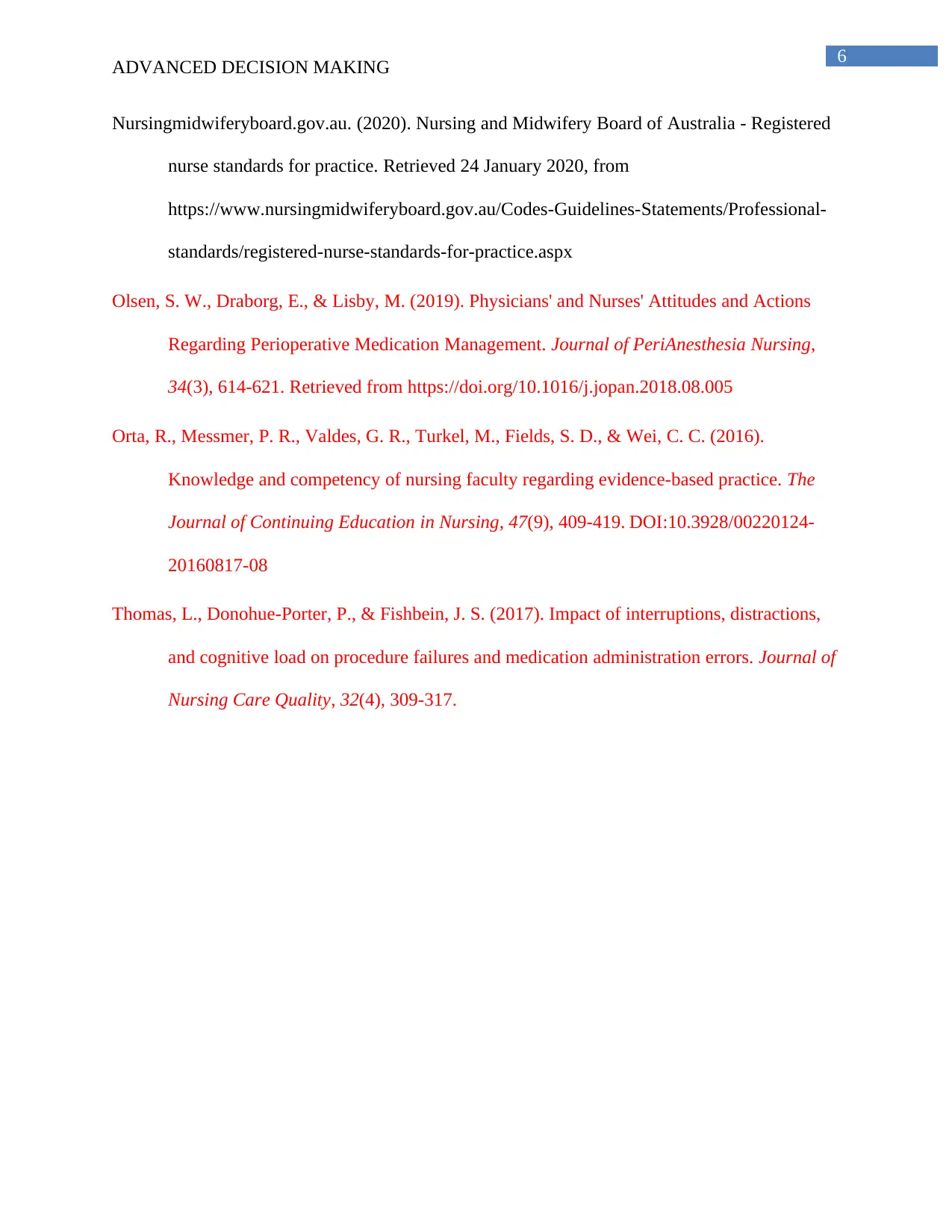
6
ADVANCED DECISION MAKING
Nursingmidwiferyboard.gov.au. (2020). Nursing and Midwifery Board of Australia - Registered
nurse standards for practice. Retrieved 24 January 2020, from
https://www.nursingmidwiferyboard.gov.au/Codes-Guidelines-Statements/Professional-
standards/registered-nurse-standards-for-practice.aspx
Olsen, S. W., Draborg, E., & Lisby, M. (2019). Physicians' and Nurses' Attitudes and Actions
Regarding Perioperative Medication Management. Journal of PeriAnesthesia Nursing,
34(3), 614-621. Retrieved from https://doi.org/10.1016/j.jopan.2018.08.005
Orta, R., Messmer, P. R., Valdes, G. R., Turkel, M., Fields, S. D., & Wei, C. C. (2016).
Knowledge and competency of nursing faculty regarding evidence-based practice. The
Journal of Continuing Education in Nursing, 47(9), 409-419. DOI:10.3928/00220124-
20160817-08
Thomas, L., Donohue-Porter, P., & Fishbein, J. S. (2017). Impact of interruptions, distractions,
and cognitive load on procedure failures and medication administration errors. Journal of
Nursing Care Quality, 32(4), 309-317.
ADVANCED DECISION MAKING
Nursingmidwiferyboard.gov.au. (2020). Nursing and Midwifery Board of Australia - Registered
nurse standards for practice. Retrieved 24 January 2020, from
https://www.nursingmidwiferyboard.gov.au/Codes-Guidelines-Statements/Professional-
standards/registered-nurse-standards-for-practice.aspx
Olsen, S. W., Draborg, E., & Lisby, M. (2019). Physicians' and Nurses' Attitudes and Actions
Regarding Perioperative Medication Management. Journal of PeriAnesthesia Nursing,
34(3), 614-621. Retrieved from https://doi.org/10.1016/j.jopan.2018.08.005
Orta, R., Messmer, P. R., Valdes, G. R., Turkel, M., Fields, S. D., & Wei, C. C. (2016).
Knowledge and competency of nursing faculty regarding evidence-based practice. The
Journal of Continuing Education in Nursing, 47(9), 409-419. DOI:10.3928/00220124-
20160817-08
Thomas, L., Donohue-Porter, P., & Fishbein, J. S. (2017). Impact of interruptions, distractions,
and cognitive load on procedure failures and medication administration errors. Journal of
Nursing Care Quality, 32(4), 309-317.
Paraphrase This Document
Need a fresh take? Get an instant paraphrase of this document with our AI Paraphraser
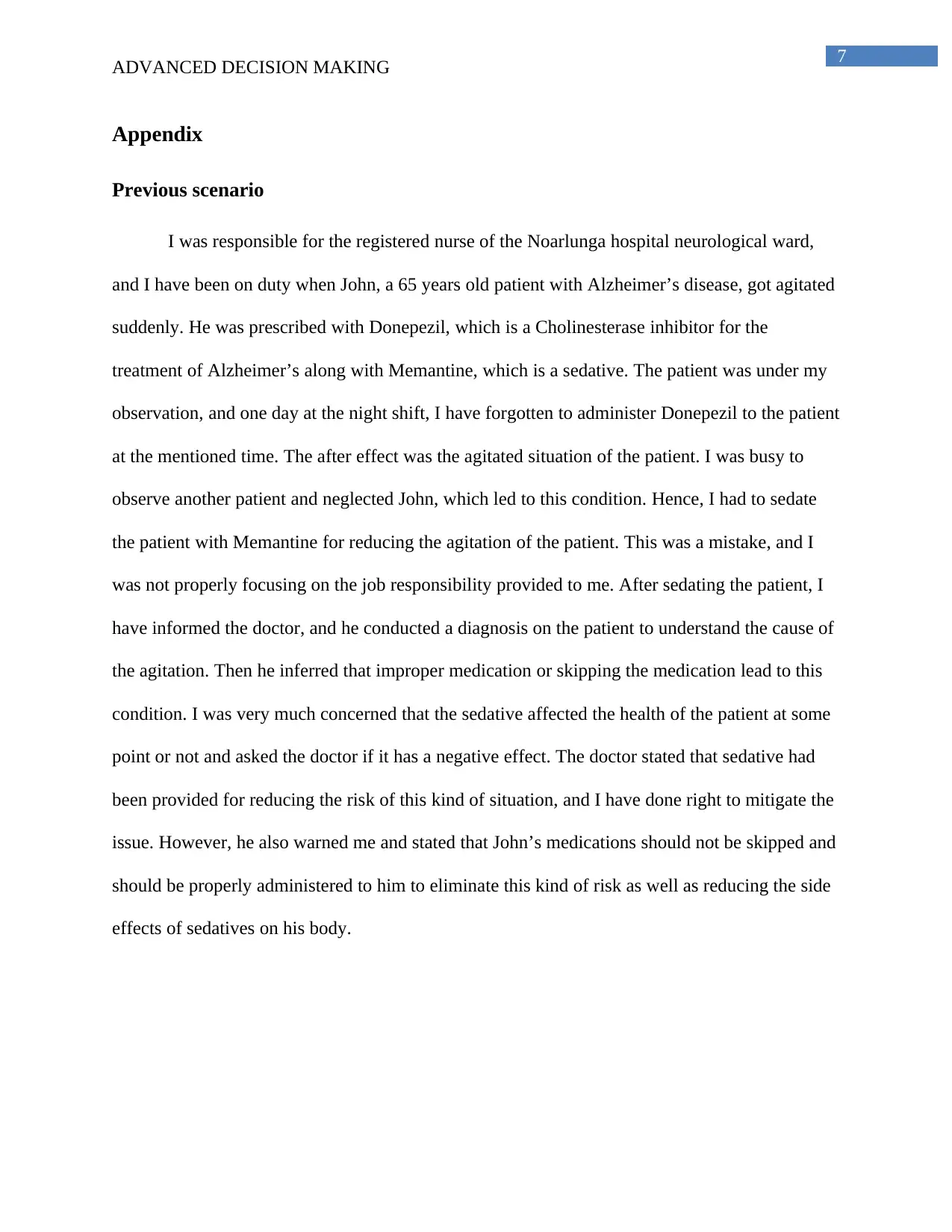
7
ADVANCED DECISION MAKING
Appendix
Previous scenario
I was responsible for the registered nurse of the Noarlunga hospital neurological ward,
and I have been on duty when John, a 65 years old patient with Alzheimer’s disease, got agitated
suddenly. He was prescribed with Donepezil, which is a Cholinesterase inhibitor for the
treatment of Alzheimer’s along with Memantine, which is a sedative. The patient was under my
observation, and one day at the night shift, I have forgotten to administer Donepezil to the patient
at the mentioned time. The after effect was the agitated situation of the patient. I was busy to
observe another patient and neglected John, which led to this condition. Hence, I had to sedate
the patient with Memantine for reducing the agitation of the patient. This was a mistake, and I
was not properly focusing on the job responsibility provided to me. After sedating the patient, I
have informed the doctor, and he conducted a diagnosis on the patient to understand the cause of
the agitation. Then he inferred that improper medication or skipping the medication lead to this
condition. I was very much concerned that the sedative affected the health of the patient at some
point or not and asked the doctor if it has a negative effect. The doctor stated that sedative had
been provided for reducing the risk of this kind of situation, and I have done right to mitigate the
issue. However, he also warned me and stated that John’s medications should not be skipped and
should be properly administered to him to eliminate this kind of risk as well as reducing the side
effects of sedatives on his body.
ADVANCED DECISION MAKING
Appendix
Previous scenario
I was responsible for the registered nurse of the Noarlunga hospital neurological ward,
and I have been on duty when John, a 65 years old patient with Alzheimer’s disease, got agitated
suddenly. He was prescribed with Donepezil, which is a Cholinesterase inhibitor for the
treatment of Alzheimer’s along with Memantine, which is a sedative. The patient was under my
observation, and one day at the night shift, I have forgotten to administer Donepezil to the patient
at the mentioned time. The after effect was the agitated situation of the patient. I was busy to
observe another patient and neglected John, which led to this condition. Hence, I had to sedate
the patient with Memantine for reducing the agitation of the patient. This was a mistake, and I
was not properly focusing on the job responsibility provided to me. After sedating the patient, I
have informed the doctor, and he conducted a diagnosis on the patient to understand the cause of
the agitation. Then he inferred that improper medication or skipping the medication lead to this
condition. I was very much concerned that the sedative affected the health of the patient at some
point or not and asked the doctor if it has a negative effect. The doctor stated that sedative had
been provided for reducing the risk of this kind of situation, and I have done right to mitigate the
issue. However, he also warned me and stated that John’s medications should not be skipped and
should be properly administered to him to eliminate this kind of risk as well as reducing the side
effects of sedatives on his body.
1 out of 8
Related Documents
Your All-in-One AI-Powered Toolkit for Academic Success.
+13062052269
info@desklib.com
Available 24*7 on WhatsApp / Email
![[object Object]](/_next/static/media/star-bottom.7253800d.svg)
Unlock your academic potential
Copyright © 2020–2026 A2Z Services. All Rights Reserved. Developed and managed by ZUCOL.





